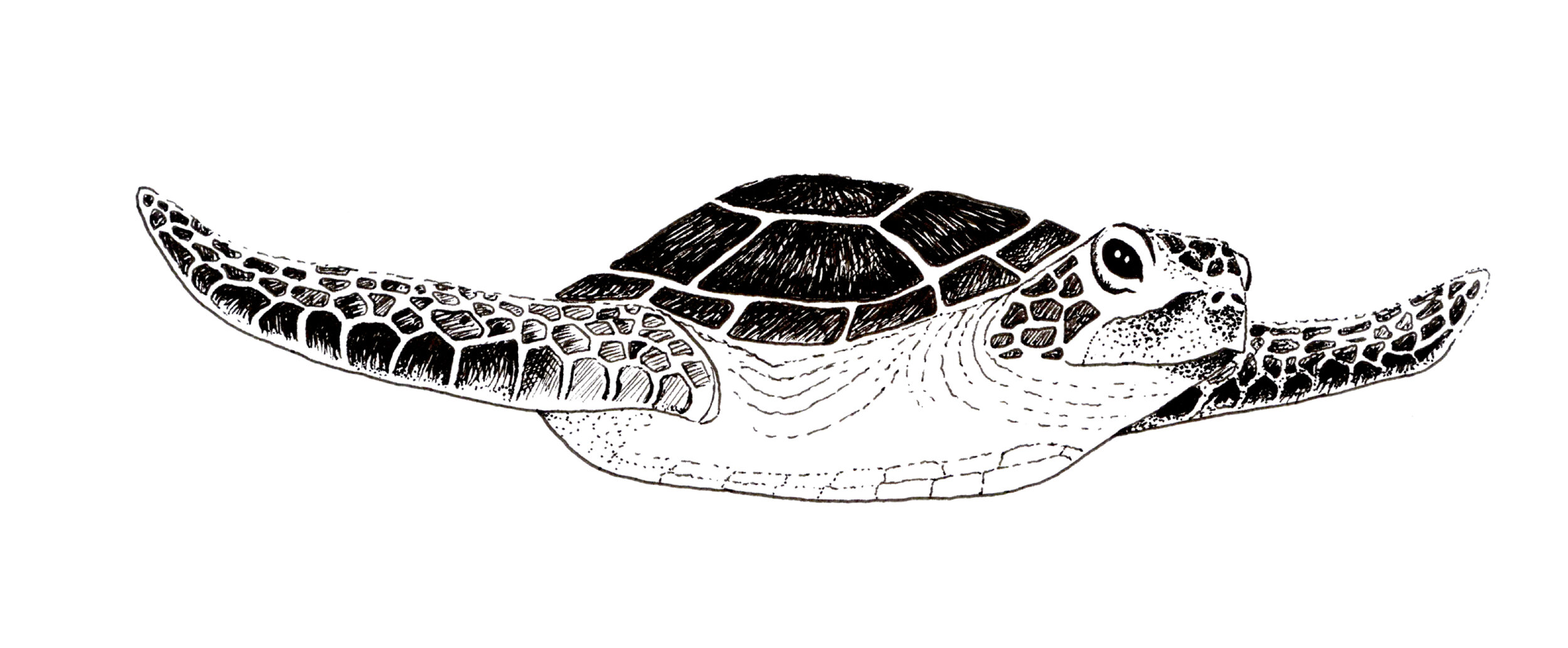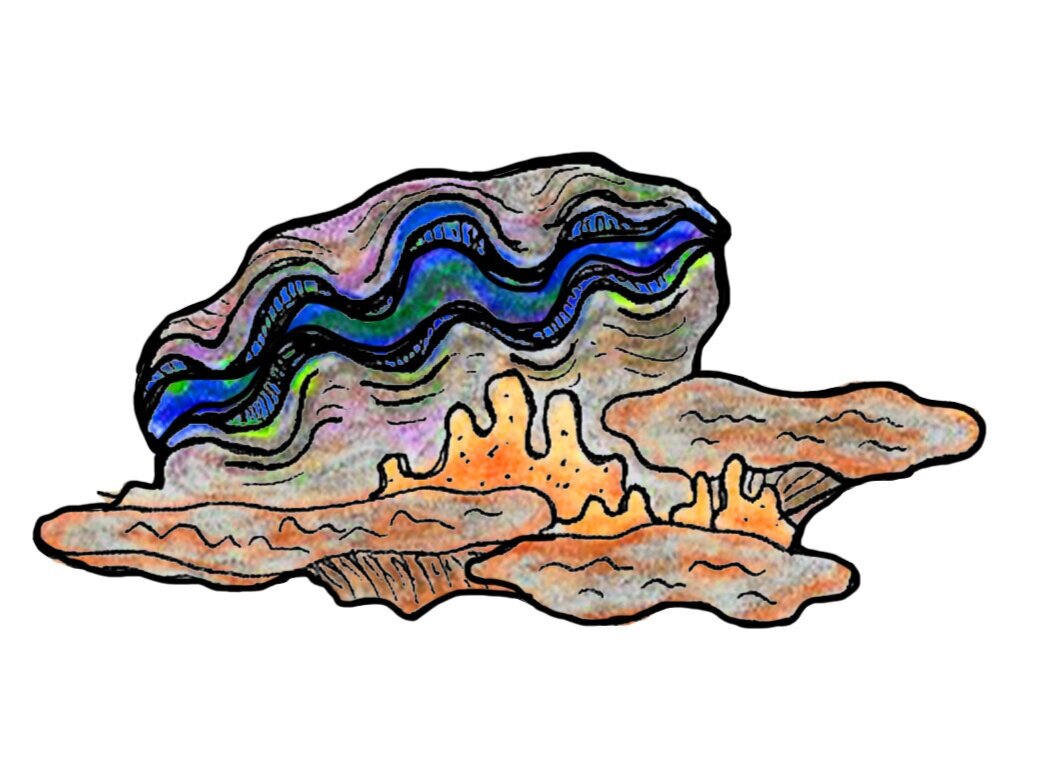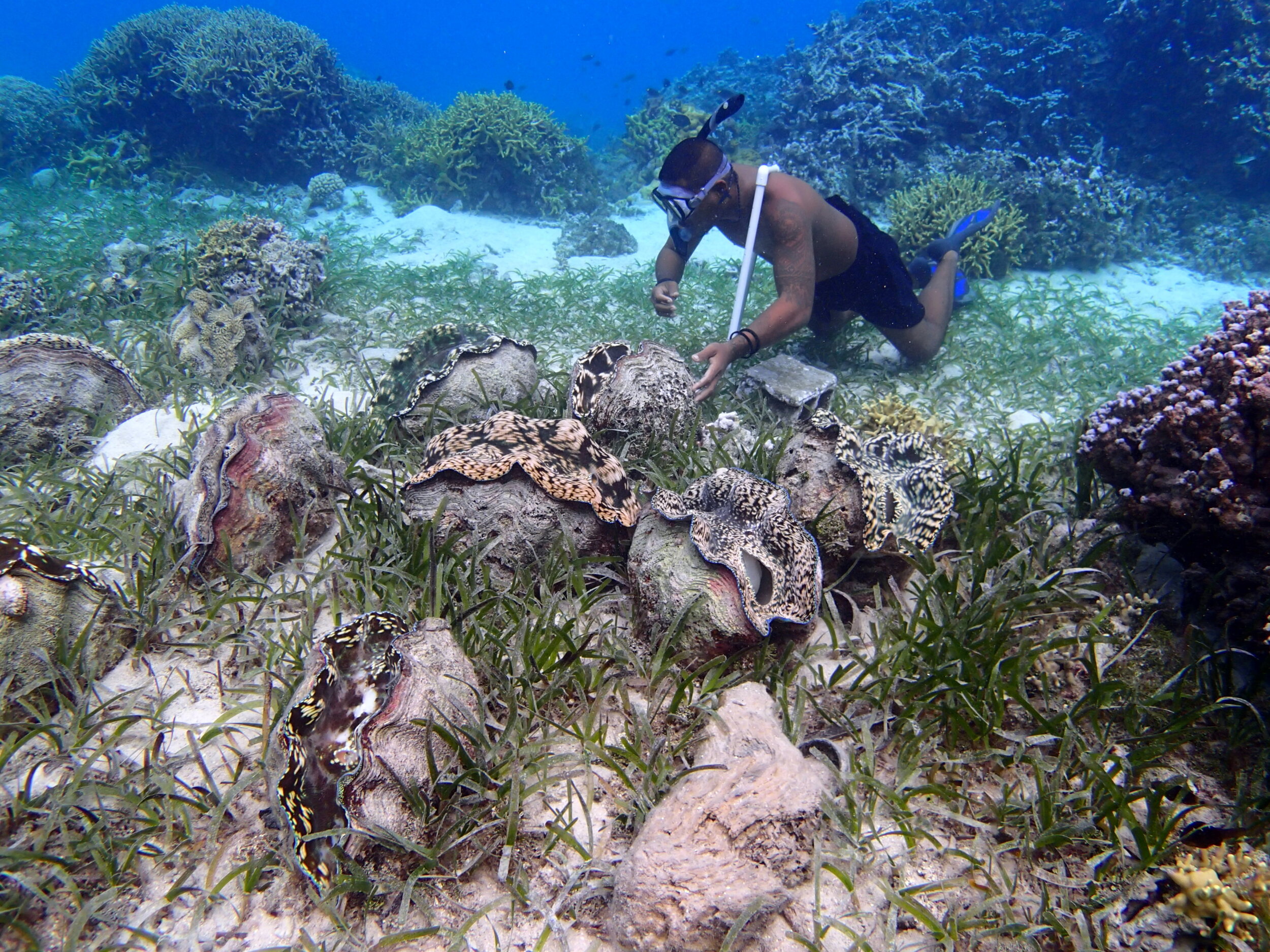The Bottomless Clamshell
One People One Reef – Weaving Science and Traditions
A story by Emma Lassiter, with science commentary by Nicole Crane
The Bottomless Clamshell and accompanying science commentary combine elements from the Ulithian stories with lessons from the work of the One People One Reef science team. A 21st century Buuch and Repiy have an adventure with echoes from the tales of Filtey, Yolfad and Forbwaey, where they meet reef creatures that teach them lessons about coral reef science and threats to reefs. The story is also informed by the Pacific Worlds Ulithi project. The science commentary adds more detailed lessons to relevant points in the story, covering topics like the impact of spearfishing, plastic pollution, and invasive species on coral reefs, and the value of traditional management practices as understood from a scientific perspective.
The numbers in the text link to the relevant sections of the science commentary, which follows on from the story.
One starlit evening, with a cool breeze blowing through the coconut trees, a group of kids sat on the beach, listening to Clotilda and Maggie tell stories. Clotilda was telling the tale of Filtey sprinkling sand on the ocean and creating Ulithi, but two of the kids – Buuch and Repiy – were paying no attention to the story. Instead they were dreaming about being out on the reef. Science commentary 1
Motigtig fished up Fais Island. This story introduces the ancient connection between Fais and Loosiep on neighboring Ulithi Atoll.
Maggie spoke next, and she began with these words: “I would like to say a few words before I begin a story; a story of long ago. Respect has always been of great importance in our community, and parents have always taught their children to practice respect. And in the past, the influence of Western education had not yet come to the islands. During the evening meal our parents would share words of wisdom and explain the way things are supposed to be done. Respect is paramount here in our islands. We have to respect people, the land, our parents, and everyone. We choose the most appropriate ways to talk to peers, people younger than us, our elders, and the chiefs. There are different levels of addressing each class of people. [In Ulithi, the best way to describe the class system is by age. The way you talk to your grandmother will be different than the way you talk to your younger sister, for example. Of course we are to respect everyone, but we are supposed to give special deference to our elders and leaders because they have more experience and therefore more knowledge (Magul)]. We know that our parents tell us how to behave, and we learn from them. Learning starts at home. We respect our fathers and mothers. If we are the younger siblings, we respect our older brothers and sisters. That is how it has always been.”[Maggie Tadog, 2018] Then she began to tell the tale of Loaroab and her son Motigtig, and how he and his brothers pulled up Fais island while fishing, showing the ancient connection between Fais and Losiep, and the island’s wealth of local food. Science commentary 2
But Repiy heard not a word of this. (He was not acting as wisely as his name suggested!) All he could think of was how Filtey went first to Mangyang. “Mangyang,” he said to himself. “Such a great place to go fishing.” He could almost taste that freshly caught Row, and his mouth began to water at the thought. He turned and whispered to Buuch, “Hey Buuch! Did you see Roderick’s Facebook pictures of the Row he speared on Mangyang last year? Let’s go there tomorrow and get some!” Buuch said, “Sure, sounds like fun!” Science commentary 3
Row / steephead parrotifish [Chlororus microrhinos]
The next morning, they got up early and took off in their uncle’s motorboat without asking permission from him or from the raat, knowing that if they did, permission would not be given. That reef was closed to fishing until further notice, and anyway, there wasn’t a lot of boat fuel available at the moment. Science commentary 4 “We’ll go so fast on that boat that no one will see us, and I’m not scared of old Lugeleng punishing us – that guy’s just some old myth!” laughed Buuch. Science commentary 5
As soon as they arrived on Mangyang, Repiy jumped into the water with his speargun and headed out to the edge of the reef where he thought he’d have the best chance of finding the Row. But Buuch didn’t care about fishing. He was a daydreamer, and just loved to watch the life of the reef – the tinier the creatures, the better. His friends called him ‘crazy’ because he would spend hours exploring the reefs, but never caught any fish.
“We are Acropora, this coral colony here. We are many polyps, but one colony”
After a while, Repiy was getting frustrated. All he could find were small fish, almost not worth spearing. None of the large, bright-blue humpheaded ones he had hoped for. He looked around for Buuch to learn if he had seen anything, but he was nowhere to be found. Buuch had swum off to his favorite spot, a patchwork of different corals, dotted with clams of all colors. As he was watching and drifting and dreaming, he heard a chorus of whispers calling out, “Hey, you! Buuch!” He spun around and didn’t see anyone. But the voices carried on. “Yes, we’re talking to you! We are Acropora, this coral colony here. We are many polyps, but one colony.” 6
Buuch thought “Well, now I’ve really earned my name – I must be going crazy, hearing voices. Help!” But the voices just carried on.
Holach / convict tang / Acanthurus triostegus are important to reef health as they eat algae, helping balance the growth of algae and coral on the reef.
“We don’t normally talk to your kind, but we’re in trouble. Look here at these patches of white. We are bleaching. Our algae friends, the Symbiodinium, are getting so stressed out they’re just packing up and leaving, and we don’t know why! Without the sugar they feed us, we won’t last long, and we will die! It’s true that at night we can use our tentacles to catch a little food, but it’s not enough, certainly not enough for us to grow the colony. And that’s not all! Look over there at our coral neighbor Pocillopora. That plastic bag smothering it, it’s bringing disease to the reef. 7 And look at that patch of algae. We used to get along ok as neighbors. They stuck to their patch, and we stuck to ours, but recently it’s getting out of hand and growing over us. Honestly, we think it was the big Maaw and the huge schools of Holach that kept them in check, but nowadays there aren’t so many. It seems like those Maaw let themselves get speared too easily at nighttime, and those fancy nets they’re using these days catch so many more Holach than before… They’re catching them before they have a chance to make their babies. Your spirit Yalulwei used to take care of us, but we don’t see him round here much anymore…”
And the colony sighed, and Buuch thought he could see a cloud of tiny orange specks rising from its branches. By now he was feeling pretty unwell and thinking about heading back to shore, but just as he turned to leave, a large Row swam right up to his mask and stopped, staring at him, its brilliant blue body somehow transparent. A moment later the fish addressed him in a surprisingly high voice. “While you’re here, young man, I have something to say to you too. I see you admiring my impressive size, my bright colors and my large hump. So you should. Now there are no large males like myself. You wonder why you can see right through me – I am a ghost. I ended up on the wrong end of one of your spears just like all my brothers, and now our females can’t find partners for the spawning dance. They are left to dance alone, and all their precious eggs just become fish food. Otherwise they hurry to change into males before they’re really ready, but then we end up with smaller females and smaller males, and many fewer striped little mangochngoch. So your friend there wants a tasty meal today, but he’s taking from the mouths of his grandchildren. Think about that!” And it swam away with a sharp swish of its moon-shaped tail. 3
Buuch didn’t wait around to see what would start talking to him next. He swam to the beach as fast as he could, thinking, “This is how Motigtig must have felt when those giants appeared on Fais.” By the time he got there, Repiy had made a fire and was cooking his small catch. The smoke curled upwards and stretched out like a sky bridge towards Mogmog, but neither boy noticed, Repiy lost in his disappointment, and Buuch in his shock. As they ate, he tried to tell Repiy about the talking coral, but his friend just laughed and told him he sounded like his Aunt Tadog who insisted she had talked to a pig. Buuch thought, “Yes, and that pig did exactly as she asked, and that kept it safe from the storm,” but said nothing.
Tracks left by a nesting green sea turtle, Geilob Island, Ulithi Atoll
At the end of their small meal they still felt hungry, and Repiy suggested they go on to Geilob to collect turtle eggs. Buuch knew this meant breaking more rules – the turtle egg season was already over – but who knew what the point of those old rules was anyway. The turtles were still arriving on the beach every night and making their nests, that was for sure. So he agreed, and as they prepared to leave, Repiy took the trash and scraps from their meal and tossed them into the sea, laughing, “For Yalulwei!” 8,9
Buuch loved visiting Geilob, with its wide sandy beach and its forest camp evenings of dancing around the bonfire, eating coconut crab, searching for the little blind snakes, and listening to the calls of the birds – and of course the nesting turtles, so fast and agile in the water, that struggled their way up onto the beach and dug down, down, as if in a dream, to lay their dozens of eggs in the cool, wet sand. As Repiy set off along the beach looking for the telltale sign of tracks in the sand to lead him to a nest , Buuch slid back into the water, feeling it was too hot to be out in the blistering sun.
He swam away from the edge of the island to that magical dividing line where the reef drops away in a vertical wall, giving way to the deepest shade of blue. Staring down into those unfathomable depths, he remembered the time some Americans came with a submarine, wanting to visit the deepest place in the ocean, a place they called the Challenger Deep, and based themselves on the nearest speck of land, which just happened to be Ulithi Atoll. Turns out those depths could be measured after all, at least if you had the right materials. He thought about the marvelous creatures he watched on the reef and wondered what other marvels might be hidden beyond the reach of his lungs down in the depths. As Buuch’s imagination ran wild with the possibilities, he almost forgot about the talking coral. Suddenly, a large green turtle swam right up to him and waved its front flipper in his face. This was definitely not normal turtle behavior on Ulithi, where turtles know full well that they are so prized for their protein that people have developed important rules and rituals to regulate their consumption
“Well hello young man!” said the turtle, in a surprisingly friendly voice. “I’m Mwayu the turtle, pleased to meet you!”
“P-p-p-pleased to meet you,” stammered Buuch, swallowing hard to make sure his ears weren’t playing tricks on him.
Ulithian Calendar, as dictated by Mariano John Laimoh and with input from Steven Tilwemal.
"We have two seasons: summer and fall, " Mariano continues. "We call Fall Lliifaeng, and summer is Lerreg. Lliifaeng is considered to be a rough season." From Pacific Worlds Yap-Ulithi Website: “Winds” Pacific Worlds, 2003
“I can see you’re a little shocked that I’m talking to you, so I’ll get straight to the point,” the turtle continued with a twinkle in its eye. “I saw that you and your friend there have come to raid our nests. Now, I don’t know whose idea it was to call your friend Repiy, but he seems to have forgotten the wisdom of your elders, who never collected turtle eggs after Giiuy. They understood that the eggs they collected from those early nests didn’t have much chance of hatching, since they mostly got dug up by the turtles that arrived later. And they left the later nests alone for the sake of the next generations – ours and yours. Like you humans, we turtles live for a long time. I am over 40 years old. I’ve even swum to Taiwan and back, and the elder turtles still think of me as a youngster. It takes a hatchling more than 25 years to become ready to lay a nest of her own. And you may look in our nests and think there are so many eggs, how could we ever run out of turtles, but you aren’t the only creatures who stand in the way of our babies making it to adulthood. Crabs, birds, and fish have always taken their share, but people have brought not only their only hungry bellies, but also hordes of hungry rats and monitor lizards to our nesting sites. They destroy all of our nests, and they’ve driven away the birds that used to nest there too. Well, I’m talking a lot, but the point is that we’ve got plenty of problems to deal with, and having you dig up our Geilob nests this late in the season is one too many. If you carry on like this your grandchildren will only know about turtles from stories. Thank you for listening. I’m sure I’ll be seeing you again.” And the turtle swam off with a wave of his flipper.9,10
His head spinning, Buuch decided he’d had enough of this adventure and just wanted to go home. He went and found Repiy, who had a Happy Time bucket full of turtle eggs, and pointed to the setting sun, saying, “Come on, let’s go.” But when they went to start the boat’s motor, nothing happened.
“Dude, we’re out of fuel!” said Repiy. “If we don’t make it back home tonight, we’re gonna get in some serious trouble. What are we going to do?”
“Wait a minute. Where on earth did that come from?” Repiy’s mouth was hanging open. On the beach behind them was a beautiful paddling canoe , carved from the trunk of a breadfruit tree, its joints glued with sap, and filled with lime ground from coral skeletons.
model paddling canoe. From From Pacific Worlds Yap-Ulithi Website: “Sea” Canoe Carving. Pacific Worlds, 2003
“I have no idea,” replied Buuch, “But it looks like we’re paddling home!”
Looking up they saw the first stars appearing in the darkening sky.
“Oh man, when I visited Majuro they told this whole story about One Sail and Ten Brothers. It was about the mother of all stars, and the ten stars we use for learning navigation. The mother was Liktanur, and the oldest son Timur, I think, but I can’t remember the rest of the names, or whether it goes from west to east or east to west. Oh, or how about Mwaey, that story about the guy with all the skin diseases? There was something about a copra facing Mailap.” Repiy frowned, trying to remember.
Buuch looked annoyed. “A great help you are, let’s just get going!”
As they paddled out into the channel, a strong wind started blowing from the west. “Oh man, it’s starting to feel like Lliifaeng. I don’t think we’re going to be able to paddle against this wind. If only we had a sail…”
“If only we knew how to make one! I’ve seen my auntie do it with pandanus leaves and coconut twine.”
By now there was a full-on storm blowing, the rain was coming down in sheets, the waves were coming over the canoe, and the two boys couldn’t bail the water out fast enough. Finally, a massive wave washed the boys out of the swamped canoe. They managed to hang on to each other, but they had no hope of reaching the canoe, which had been blown out of reach. It was all they could do to stay afloat. Just as they thought they would surely drown, Repiy felt something solid beneath his feet and yelled out “Reef!”
Echoing Forbwaey, the original navigator, he stood up and said, “All right! I will live. I am standing on coral.”
“Well, that’s the first sensible thing you’ve said all day” came a soft voice. You’re right, coral is life, for you and for all of us that live in and around the reef.” Repiy blinked, and his eyes grew wide as he realized that the vivid blue and gold clam in front of him was opening and closing like a mouth, the words bubbling out of it.
The clam continued; “I am Tridacna, though I believe you call me ddog, and before you reach for your knife, you’d do well to listen carefully to what I have to say. It is the coral that built your islands and continues to build the reef, making homes for all the rest of us. If you think you see a lot of life swimming above the reef, you should see inside: the worms, the shrimp, the crabs, the sponges, the thousands and thousands of little fish. All of these are what feed the larger fish that you so like to eat. Take the coral away, and the rest goes with it, like taking away the foundation posts for the men’s house. But more than that, all of the life on the reef is connected, and if you take away any one piece, you cannot know what the consequences will be.
“We Tridacna used to have a very good cooperation with your kind, and some of our Eastern cousins still do. You would gather us together in one place and let us grow really big, in a kind of garden. Leave us alone and some of us can live as long as your great grandmother and grow large enough for you to take a nap in! Like the coral, we have algal friends – the Symbiodinium – that harvest the sunlight and share its energy with us in exchange for our protection and the nutrients they lack. In case you were wondering about our gorgeous colors, we make them to help the Symbiodinium gather more sunlight, which is good for both them and us. But I’m getting off track; I was telling you about our old partnership. When the tide and the moon were right, and one of us sent out the signal that it was time to spawn, we were all gathered close together and our eggs and sperm could easily find each other. You see each of us releases both eggs and sperm, but to make a baby – we call it a larva – they need to join with the sperm or egg from another clam. That larva drifts with the currents for seven nights or more, feeding on other plankton, growing until it finds a good place to settle and grow into a clam. In that way, the future of our kind was safe. And what was the benefit of this partnership to your kind? Well, every so often you would take one of us, and be able to feed many mouths.
Tridacna clam garden, Lamotrek Atoll, 2014
“Oh, hi there Mwayu. Good to see you again!”
The turtle from Geilob left the patch of seagrass it had been grazing on and joined them. Buuch turned to Repiy and raised his eyebrows, as if to say, “I told you so!”
“I see you’re schooling our young friends here,” Mwayu smiled. “Many creatures of the reef make their babies as Tridacna does, with larvae that float on the currents, many becoming food for larger creatures, a few settling close to their parents, and others on a distant reef.”
Tridacna added, “So our families, like yours, are spread across the outer islands, and what happens here on our Ulithi reefs affects our cousins in Fais, Woleai, Elato, Satawal, and even Namonuito Atoll in Chuuk. We are many reefs, many communities, but at the same time we are one reef, just as you are one people.”11
The turtle continued; “Your ancestors learned a great deal about how to live in a way that kept everything in balance, and they told stories to pass their knowledge and wisdom down the generations. I have traveled the length of the Yap Outer Islands, and swimming eastward is almost like traveling back in time. There are reefs that look like these used to look – so many kinds of coral, so many different fish; the people use canoes as well as motor boats, they use many different kinds of fishing, which means they don’t take too many of any one kind of fish, and there are even some giant clam gardens . And every evening I hear them telling their stories, singing, and laughing. There are some really good stories.”
“Out there they still remember Yalulwei, and the lesson he taught Forbwaey, who did not believe that the little water in the clamshell Yalulwei offered him would quench his thirst. But he found that no matter how much he drank, the clamshell was always full. This is the real magic: If you only take what you need from the reef – and treat it with respect – the system can and will replenish itself. But even those reefs are facing serious challenges, as we are all part of the larger natural system. Their health is suffering from plastic trash, from stronger storms, from a warmer and more acidic ocean, and from the commercial fisheries that take and take and take, and then move on once they have emptied the ocean and leave nothing to replenish the system. You – the people of the ancient reefs you call ‘islands’ – must act as stewards, managing the reef so it survives for our grandchildren and yours. As you say on Ulithi, “Hofagie Laamle!” or “One People One Reef!” And that concludes today’s lesson. I have to go now – things to do, people to see!” And off he went.
Buuch and Repiy looked up and saw the sky getting lighter in the east, the storm long gone, the sea now glassy flat. They realized to their amazement that they were right in front of the Mogmog men’s house. “Man, that was one crazy adventure,” sighed Buuch. “But I know what I’m doing today. I’m going to take a gift to Steve Tilwemal and ask if he’ll teach me about navigation!”
“Do you know, I loved paddling in that canoe. At least until things got crazy. I’m going to take a gift to Daniel Dig and ask him to teach me how to build my own. Then I’ll never run out of gas. You can be my navigator!”
“That’s if we ever get permission to go fishing again, once we explain where we left Uncle’s boat...”
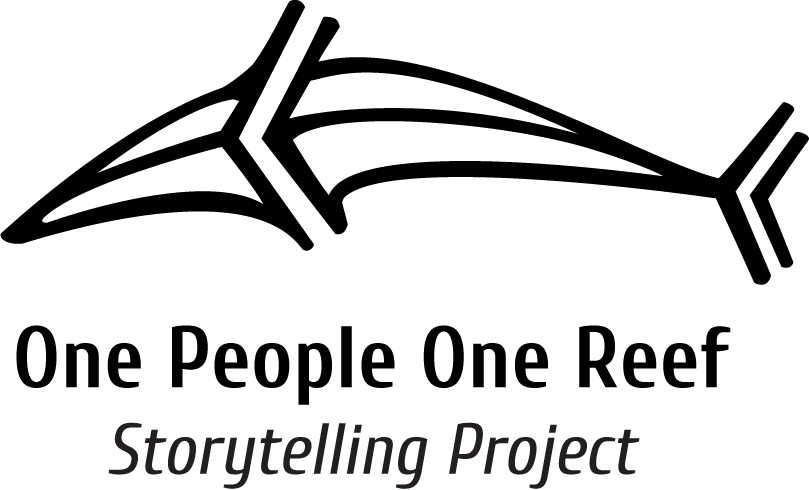

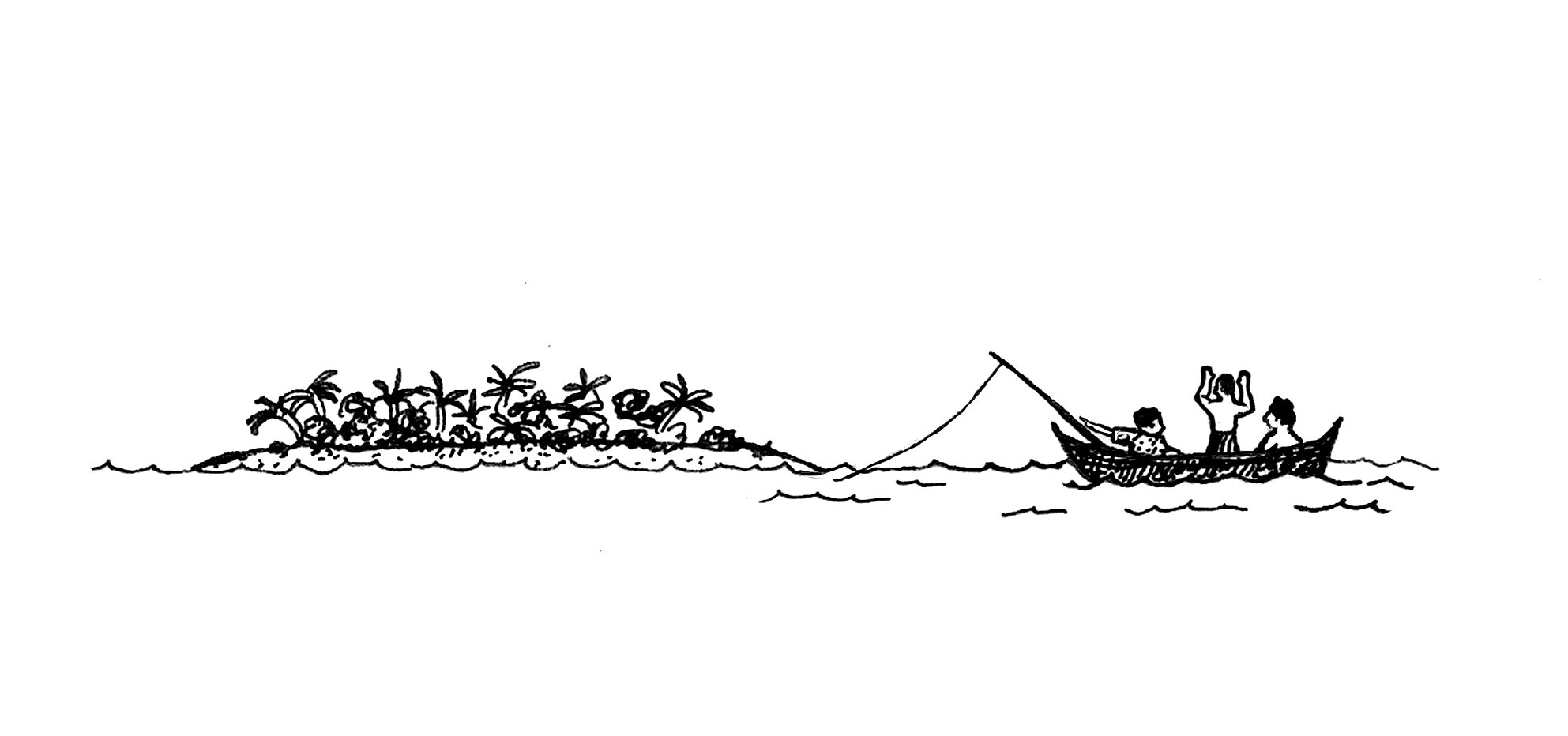
![Row / steephead parrotifish [Chlororus microrhinos]](https://images.squarespace-cdn.com/content/v1/5d3b1d2e6cb5ab00017651c1/1573582025653-HCETSJ7VH4HDAPTXUWVM/row.jpg)



